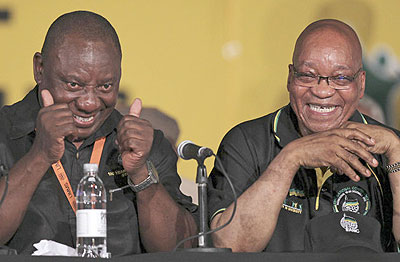Jacob Zuma was Tuesday re-elected as leader of South Africa’s governing African National Congress.He received an overwhelming majority of votes cast by some 4,000 delegates at the party’s Mangaung conference.


Jacob Zuma was Tuesday re-elected as leader of South Africa’s governing African National Congress.He received an overwhelming majority of votes cast by some 4,000 delegates at the party’s Mangaung conference.Mr Zuma had been favourite to secure the leadership after he was challenged for the top job by his deputy Kgalema Motlanthe.Mr Motlanthe has been replaced as deputy president by anti-apartheid veteran Cyril Ramaphosa.The ANC, which has governed South Africa since white minority rule ended in 1994, is widely expected to win nationwide elections due in 2014.This means Mr Zuma is likely to remain president until 2019.Meanwhile, four white men have appeared in court accused of being part of a right-wing extremist plot to bomb the ANC conference.The men were arrested on Monday in raids across the country and reportedly face treason and terrorism charges.Flagging supportThere were deafening sounds of vuvuzelas, huge applause and singing as the results of the election were announced, the BBC’s Milton Nkosi reports from the conference.Mr Zuma won 2,986 votes out of the 3,977 cast – making it a decisive victory against his rival, Kgalema Motlanthe.Mr Motlanthe ended months of speculation by announcing his decision to run against Mr Zuma for the leadership and declining to stand again as deputy leader.It is not clear where this result leaves his political career.But it marks a return to the political frontline for Mr Ramaphosa, a veteran of the anti-apartheid movement and more recently a successful businessman.His decision to run as Mr Zuma’s deputy has been seen by analysts as a way of shoring up the president’s flagging support.Mr Zuma has been accused of failing to reduce poverty or tackle corruption within the ANC and government, while in August there was widespread shock when police shot dead 34 striking miners in the most deadly police action since the end of apartheid.Some of President Zuma’s supporters began celebrating his win, even before the results were in.Zuma at a glance— April 12, 1942: Born in Inkandla in the rural Zulu heartland.—1959: Joins the ANC as a teen and just a few years later is arrested while trying to leave the country illegally. Jailed for 10 years on Robben Island, alongside Nelson Mandela.—1975: Goes into exile. For the next decade and a half in Swaziland, Mozambique and Zambia where he was appointed chief of the ANC’s intelligence department.—1990: ANC unbanned and Zuma among the first leaders to return to South Africa.—1994: After first all-race vote, serves as economic affairs minister in KwaZulu-Natal, his home province.—1999: Then-president Thabo Mbeki names him deputy president.—2003: Prosecutors say they have a case against Zuma, but not one they are sure they can win, and so decide not to prosecute. Zuma was accused of taking a 500,000-rand bribe to protect a French arms company from a government probe into corruption. The corruption investigation centered around a 1999 deal for South Africa to buy ships, submarines, helicopters, jets and other weaponry from European and South African firms.—2005: Fired as deputy president, but remains deputy president of the ANC under Mbeki, after being implicated in corruption trial of close friend and financial adviser Schabir Shaik. Later that year, prosecutors say they will charge Zuma with two counts of corruption.—2006: Judge strikes Zuma’s corruption case off the roll because the prosecution is not ready. That same year, Zuma is acquitted of raping an HIV-positive family friend, although his confession that he took a shower to prevent the risk of AIDS earned him ridicule.—2007: Zuma beats Mbeki in ANC leadership race. Within days, Zuma is indicted on corruption charges.—2008: Judge dismisses corruption case on procedural grounds in ruling that raises possibility of political meddling in the case. ANC responds by firing Mbeki as the nation’s president, replacing him with Kgalema Motlanthe, seen as a caretaker until Zuma can take over.—Early 2009: South Africa’s second-highest court rules in favor of prosecutors’ appeal, clearing way for new corruption trial against Zuma. However, nation’s top prosecutors, acknowledging case had been tainted by political meddling, drop corruption charges and say they won’t be refiled, though they insist case is solid.—April 22, 2009: Zuma’s ANC party sweeps parliamentary elections.—May 6, 2009: South Africa’s Parliament elects Zuma as the country’s next president.—May 9, 2009: Zuma sworn in as president of South Africa.—June-July 2010: South Africa hosts successful World Cup, which Zuma said showed nation’s ability to stand on world stage and be "united in our diversity.”—May: An art gallery shows "The Spear,” a painting of Zuma with his genitals exposed. The ANC demands the painting be removed and vandals later deface it.—August: Police officers open fire on striking miners, killing 34 in the worst violent attack by state security forces against protesters since the end of apartheid. Zuma faces criticism for his response and the ANC is accused of ignoring the poor they should represent.—December: ANC holds its convention in Mangaung to pick its leader for the next five years, overwhelming re-electing Zuma over Deputy President Kgalema Motlanthe.


